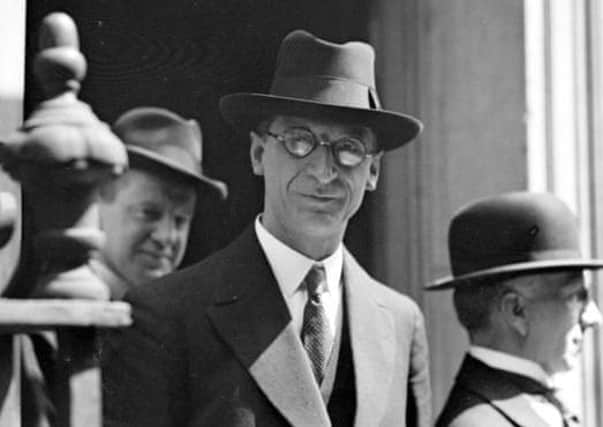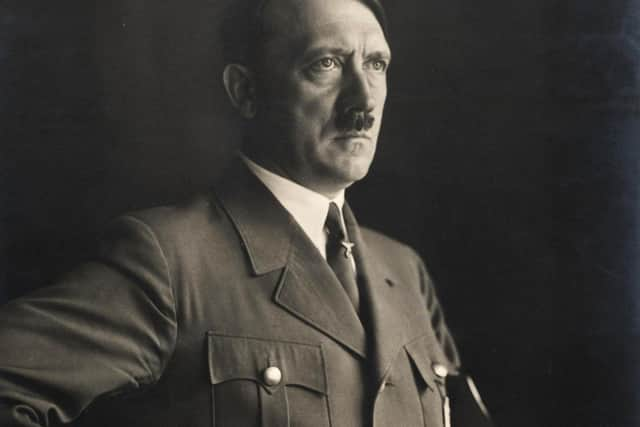Eamon de Valera’s ‘moral myopia’ in offering condolences to Germany over Hitler’s death put Ireland beyond the pale for many people


On May 2 1945 Eamon de Valera as Irish prime minister and minister for external affairs, accompanied by Joseph Walshe, the secretary of the Department of External Affairs, visited Dr Eduard Hempel, the German representative in Dublin, to sign a book of condolences opened on account of the death of Adolf Hitler.
Walshe claimed that he and Frederick Boland, the assistant secretary of the department, had implored de Valera not to go.
Advertisement
Hide AdAdvertisement
Hide Ad‘Literally on bended knees, we asked him to remember all the Irish-Americans who had lost their lives [during the war], but because he had been to the United States embassy two weeks earlier to condole on the death of [President] Roosevelt, he was afraid of being accused of being partisan.’


Dr Hempel, probably a career diplomat obliged to join the NSDAP (the Nazi Party) in July 1938 rather than an enthusiastic member, was apparently glad to be rid of Hitler and expressed concern to de Valera about the interpretation that would be placed on the visit.
An unconcerned de Valera replied: ‘I do what I think is right.’
Hempel told Boland afterwards that he was aghast and did not know what to say.
Advertisement
Hide AdAdvertisement
Hide AdDe Valera’s gesture – unique among leaders of neutral nations in the final weeks of the Second World War – attracted widespread international condemnation.
De Valera anticipated the furore he had generated but he gave specific instructions to the Department of External Affairs not to mount a defence of the visit.
Nevertheless de Valera did offer a defence (albeit a revealing and less than convincing one) of his conduct in a private note to Robert Brennan, Eire’s envoy to the United States and a long-standing friend.
‘I have noted that my call on the German Minister on the announcement of Hitler’s death was played up to the utmost.
Advertisement
Hide AdAdvertisement
Hide Ad‘I expected this. I could have had a diplomatic illness but, as you know, I would scorn that sort of thing ... so long as we retained our diplomatic relations with Germany, to have failed to call upon the German representative would have been an act of unpardonable discourtesy to the German nation and Dr Hempel himself.
‘During the whole of the war, Dr Hempel’s conduct was irreproachable. He was always friendly and correct in marked contrast with [David] Gray [the US Minister in Dublin whom de Valera heartily detested]. I certainly was not going to add to his humiliation in the hour of defeat.’
De Valera’s concern for Hempel’s personal feelings suggests a decidedly perverse sense of priorities.
There is a strong suspicion that insulting Gray and ‘ruffling the feathers of the American eagle’ may have been uppermost in de Valera’s mind, an interpretation of de Valera’s actions which also occurred to Sir John Maffey, the UK’s representative in Eire, at the time.
Advertisement
Hide AdAdvertisement
Hide AdDe Valera impressed on Brennan that the visit denoted neither approval nor disapproval of Hitler and defended his actions on the grounds of logic and protocol.
Objectively, de Valera went far beyond the requirements of protocol.
In neutral Sweden and Switzerland no condolences were presented. In neutral Portugal, Dr Salazar’s quasi-fascist state, flags were flown at half-mast on public buildings and that was considered adequate.
The editorial of the New York Times addressed the question of protocol on May 4: ‘In making the personal call at the German legation in Dublin it is possible that de Valera was merely following the protocol required of a neutral state. Considering the character and the record of the man for whose death he was expressing grief there is obviously something wrong with the protocol of neutrality or with de Valera.’
Advertisement
Hide AdAdvertisement
Hide AdThe Washington Post’s editorial on the matter was entitled ‘moral myopia’, a view endorsed by historians such as Henry Patterson.
De Valera’s conduct was a source of considerable embarrassment to Irish Americans.
T Quill, president of the Transport Workers Union of America, comprehensively denounced de Valera’s action in the Transport Bulletin: ‘This is not only a crime committed behind the backs of the great Irish people in the homeland, but it is also an insult to the sons and daughters and friends of Ireland all over the world who have never ceased to take their rightful place amongst the forces fighting for decency, freedom and democracy.’
Angela D Walsh, with an address at East 44th Street, New York, wrote to de Valera on May 4: ‘I am horrified, ashamed, humiliated ... You, who are the head of a Catholic country, have now shown allegiance to a devil.’
Advertisement
Hide AdAdvertisement
Hide AdShe posed de Valera a series of hard-hitting questions: ‘Have you seen the motion pictures of the victims of German concentration camps, de Valera? Have you seen the crematoriums? Have you seen the bodies of little children murdered by Nazi hands? Have you seen the flourishing cabbages – cabbages for German food – flourishing because of the fertiliser, human remains of citizens from almost completely Catholic countries like Poland?
These were citizens of a conquered country – and Éire might easily have been a conquered country, neutrality or no neutrality. Have you seen the living dead, de Valera? Skin stretched over bone, and too weak to walk?’
Many citizens of Eire were also appalled. Corporal O Wynne, a Dubliner serving in the British Army, wrote to de Valera, describing de Valera’s visit as Eire’s ‘final disgrace in the eyes of the whole world’ and ‘an act which is little short of treason against all decent, freedom-loving Irishmen, Roman Catholic and Protestant’.
Wynne believed that the results that would flow from de Valera’s action would not be inconsequential: ‘By your unforgivable act you have alienated any remaining sympathy or friendship for Eire.
Advertisement
Hide AdAdvertisement
Hide AdWe are now a nation exiled from the rest of the world. We can never hope to be respected as a nation.’
The world has proved to be much more forgiving than Wynne anticipated.
Yet an audit of the cost of de Valera’s action in the post-war world would make for an interesting study.